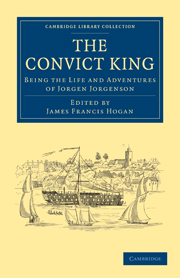CHAPTER II
Published online by Cambridge University Press: 05 August 2011
Summary
At that early period in the history of New South Wales, owing to the infrequency of supplies from England, provisions and other articles of consumption were often sold at enormous prices. It was no uncommon thing to give ten guineas for a gallon of rum, tolerably diluted. Tobacco was proportionately dear, and tea was never under a guinea a pound. Money itself sympathised with the general rise. The common penny pieces passed for two-pence, and half-pence for pence. A large quantity of copper was speculatively brought out from England by shipmasters, who thus realised a profit of 100 per cent, without the smallest trouble; the colony ultimately became most inconveniently loaded with copper money. The evil was worse than in the days of Wood's half-pence, which Dean Swift so ably suppressed, and Governor King was eventually compelled to put his veto on the farther introduction of such money. He speedily settled the difficulty by reducing pence and halfpence to their real value.
It was in 1803 that we set sail from Sydney with Captain Bowen, R.N., as commandant, to assist in establishing a settlement on the Derwent, in Van Diemen's Land. The late Dr. Mountgarrett and two ladies, whose names I have still the pleasure of enrolling in the number of my friends, accompanied us on the expedition. We disembarked our passengers and stores on the north bank of the Derwent at Risdon.
- Type
- Chapter
- Information
- The Convict KingBeing the Life and Adventures of Jorgen Jorgenson, pp. 54 - 66Publisher: Cambridge University PressPrint publication year: 2011First published in: 1891



